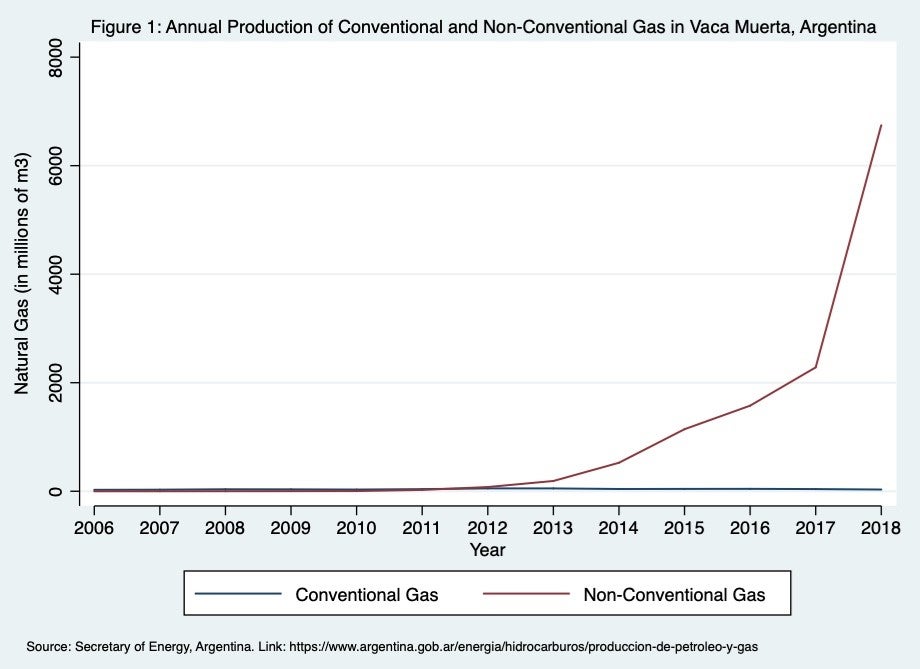
Presidential Elections and Fracking in Argentina
Regardless of who wins, Argentina's presidential elections will have little effect on the country's growing natural gas industry.
On Sunday October 27, 2019, Argentines will go to the polls to elect their president. The main contenders are the incumbent, Mauricio Macri, from the right-wing party Cambiemos, and Alberto Fernández, who leads a center-left front, Frente de Todos, and whose running mate is former President Cristina Fernández de Kirchner.
The primary and mandatory elections of August 11, 2019, when the Frente de Todos won by an ample margin, are a strong predictor that Alberto Fernández will be the next president of Argentina. He is campaigning on major economic policy changes in order to deal with the country’s current crisis.
However, when it comes to energy policy, continuity is more likely than change, particularly with regards to its fastest growing energy sector: non-conventional gas extraction (or fracking) in the area of Vaca Muerta, which is the second largest gas shale deposit in the world and is mostly located in the southern province of Neuquén. Continuity in energy policy is likely for several reasons.
First, it was Cristina Fernández de Kirchner who, as president in 2012, oversaw the initial agreement with the U.S. company Chevron to commence non-conventional gas extraction in Vaca Muerta. Second, it was Yacimientos Petrolíferos Fiscales (YPF), the oil company renationalized under her presidency, that began non-conventional exploration and extraction in that area.
Despite Cristina Fernández de Kirchner’s government interest in developing Vaca Muerta, new private investment and gas production were growing at a very slow rate. In 2017, under the presidency of Mauricio Macri, a government subsidy program incentivized investment in the sector. But quite interestingly, this subsidy, decreed via the National Ministry of Energy and Mining’s Resolution 46-E, was in fact inspired by a similar subsidy, Plan Gas, created by Axel Kicillof, when he was the Minister of Economy under Fernández de Kirchner in 2013. And this is a third reason why energy policy in Argentina is likely to remain the same.
Resolution 46-E stimulated economic investment in the production of non-conventional gas in the Vaca Muerta shale-basin in the province of Neuquén. The resolution created a subsidy program that was to be in place for five years, paying hefty subsidies to non-conventional gas extraction.
The stimulus plan worked like a charm. It increased investment and production of non-conventional gas to record levels in 2017 and 2018 (see Figure 1), mostly through the construction—in record time—of a new non-conventional extraction plant in Fortin de Piedra, operated by the Argentine company Tecpetrol. By February of 2019, Fortin de Piedra was producing 17.5 million square meters of natural gas per day, and was single handedly moving up Neuquén’s provincial gross domestic product.

However, in the context of a public-deficit-zero agreement signed between the government of Macri and the International Monetary Fund, as part of the negotiation a mega-loan in late 2018, the national government suspended Resolution 46-E and modified the terms of the subsidy, claiming that production had already reached the maximum level of natural gas transportation capacity in Argentina. Despite this major rearrangement, the industry has continued extracting non-conventional gas and there are plans to build more infrastructure to transport gas.
Amidst the current economic crisis, there will be economic and political pressure to continue extracting non-conventional gas in Argentina, perhaps even creating new conditions that would permit expanded investment and extraction. For instance, during the last month, national security forces have landed in the area of Vaca Muerta to control the territorial conflict that extraction has created, among others, with the long-time occupants and indigenous communities who inhabit the area. That conflict, also, is likely to continue with the new administration.
Tulia Falleti
Class of 1965 Endowed Term Professor of Political ScienceTulia Falleti is the Class of 1965 Endowed Term Professor of Political Science, Director of the Latin American and Latinx Studies Program, and Senior Fellow of the Leonard Davis Institute for Health Economics.

